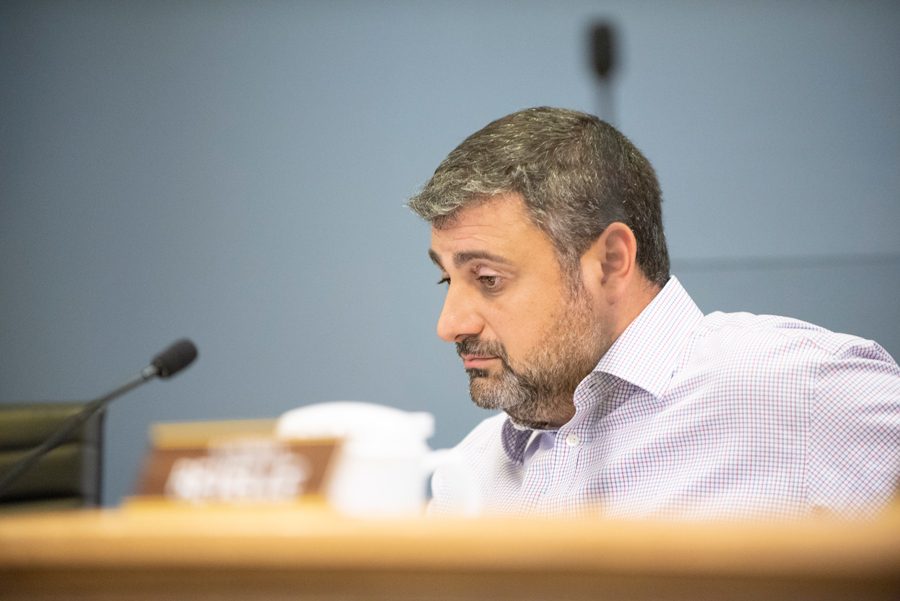Aldermen talk preliminary concerns for proposed 2019 budget
Daily file photo by Colin Boyle
Ald. Tom Suffredin (6th) at a city meeting. Suffredin said he wants aldermen to focus on long-term issues during the budget planning process.
October 16, 2018
As City Council gears up for its annual discussion of the upcoming year’s budget, aldermen are facing concerns from constituents and questions of their own. Ald. Peter Braithwaite (2nd), Ald. Tom Suffredin (6th) and Ald. Cicely Fleming (9th) all shared concerns about potential layoffs and department restructuring.
Suffredin said he is confident aldermen will pass a budget at the end of the year, but said it’s unlikely that everyone will be happy with every part of the document.
“It’s going to be a balanced budget and no one is going to be thrilled about it,” he said.
The city’s proposed budget, published Oct. 5, is approximately $319 million, down about $19 million from last year’s numbers. The initial proposal predicts a $7.4 million budget deficit that has resulted from a combination of general fund shortfalls and new expenditures, which city staff proposes to fill through department restructuring, layoffs and fee increases.
City manager Wally Bobkiewicz said on Oct. 4 that the deficit is a combination of three things: a $4.9 million general fund shortfall, a $1.5 million replenishment of recently depleted reserve funds and plans for the new Robert Crown Community Center, which will require an extra $1 million for debt service on borrowed money.
Friends of the Robert Crown Center, a nonprofit that is helping raise money for the project, said they are able to pay the city an extra $1 million to fill the deficit. The proposal is currently being reviewed by city staff.
To solve the deficit, Bobkiewicz said that staff is suggesting decreasing expenditures by an additional $4.3 million and increasing revenue by $3.3 million. This would come from a combination of fee increases, fund reductions, department restructuring and potential staff layoffs.
Fleming said that after looking over the proposal and taking into consideration the impending deficit, she’s “concerned about all of it.”
“It’s all key because it’s a huge deficit,” Fleming said. “There’s a lot of large items on there because we have such a large deficit. … I’m concerned that even with those cuts, we’re going to have a potential deficit next year.”
While Fleming said she and her fellow aldermen may not have exactly the same priorities when it comes to the budget, they are all concerned “for the livelihood of the city” and and are working for their constituents.
She said one of her areas of concern is the proposed $250,000 cut to the Mental Health Board as well as restructuring in the Department of Health and Human Services, which could jeopardize the department’s state classification.
Fleming said the cuts could mean that residents have a harder time accessing health services.
“I think we’ll see a larger number of people go unserved which has a number of negative impacts that we probably will start to see over the next couple of years,” Fleming said. “It’s not gonna happen just in one day.”
Braithwaite said he is also concerned about the proposed cuts to various departments across the city and possible staff reductions. He said it is important for residents to remember that the budget proposal is just that — a proposal, and that aldermen will be able to adjust it to better serve the community’s needs.
He is prepared, he added, to question whether the city needs to move $1.5 million into its reserve fund.
“(We can make) smart choices to preserve those vital services,” he said. “I think it’s important to take a closer look at it, and the impact it could have if we don’t.”
Suffredin said it is important for aldermen and residents to realize that not everyone will have all their priorities included in the final budget, and that the process will require members of City Council to make difficult decisions.
He said he is open to substantial cuts if they are necessary, and wants to shift the budget discussion to items that may not be the most glamorous but can help the city for years to come.
Aldermen and residents need to focus on infrastructure and planning and maintenance projects that will serve the city for decades to come, Suffredin said, like “streets, parks, police and fire.”
“The parts of (the budget) that matter are the most boring parts,” Suffredin said. “People get worked up about the things that they have an emotional response to. But most of municipal government isn’t emotional — it’s boring infrastructure and planning.”
He said there are pressing issues in the city that may get overlooked in favor of more popular initiatives, but that aldermen, in talking about the proposed budget, should be thinking in terms of long-term investment in the city.
“The City Council of 1983 could have done a lot to help out the City Council of 2018,” Suffredin said. “What can the City Council of 2018 do to (help) the City Council of 2053?”
Email: k[email protected]
Twitter: @kristinakarisch


